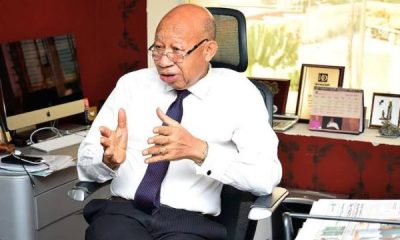Foreign
Biden pardons his son Hunter despite previous pledges not to

President Joe Biden pardoned his son, Hunter, on Sunday night, sparing the younger Biden a possible prison sentence for federal felony gun and tax convictions and reversing his past promises not to use the extraordinary powers of the presidency for the benefit of his family.
The Democratic president had previously said he would not pardon his son or commute his sentence after convictions in the two cases in Delaware and California. The move comes weeks before Hunter Biden was set to receive his punishment after his trial conviction in the gun case and guilty plea on tax charges, and less than two months before President-elect Donald Trump is set to return to the White House.
It caps a long-running legal saga for the younger Biden, who publicly disclosed he was under federal investigation in December 2020 — a month after his father’s 2020 victory — and casts a pall over the elder Biden’s legacy.
Biden, who time and again pledged to Americans that he would restore norms and respect for the rule of law after Trump’s first term in office, ultimately used his position to help his son, breaking his public pledge to Americans that he would do no such thing.
In a statement released Sunday evening, Biden said, “I believe in the justice system, but as I have wrestled with this, I also believe raw politics has infected this process and it led to a miscarriage of justice.”
The president’s sweeping pardon covers not just the gun and tax offenses against the younger Biden, but also any other “offenses against the United States which he has committed or may have committed or taken part in during the period from January 1, 2014 through December 1, 2024.”
In June, Biden categorically ruled out a pardon or commutation for his son, telling reporters as his son faced trial in the Delaware gun case, “I abide by the jury decision. I will do that and I will not pardon him.”
As recently as Nov. 8, days after Trump’s victory, White House press secretary Karine Jean-Pierre ruled out a pardon or clemency for the younger Biden, saying, “We’ve been asked that question multiple times. Our answer stands, which is no.”
The elder Biden has publicly stood by his only living son as Hunter descended into serious drug addiction and threw his family life into turmoil before getting back on track in recent years. The president’s political rivals have long used Hunter Biden’s myriad mistakes as a political cudgel against his father: In one hearing, lawmakers displayed photos of the drug-addled president’s son half-naked in a seedy hotel.
House Republicans also sought to use the younger Biden’s years of questionable overseas business ventures in a since-abandoned attempt to impeach his father, who has long denied involvement in his son’s dealings or benefiting from them in any way.
“The charges in his cases came about only after several of my political opponents in Congress instigated them to attack me and oppose my election,” Biden said in his statement. “No reasonable person who looks at the facts of Hunter’s cases can reach any other conclusion than Hunter was singled out only because he is my son.”
“I hope Americans will understand why a father and a President would come to this decision,” Biden added, claiming he made the decision this weekend.
The president had spent the Thanksgiving holiday in Nantucket, Massachusetts, with Hunter and his family, and was set to depart for Angola later Sunday on what may be his last foreign trip as president before leaving office on Jan. 20, 2025.
Hunter Biden was convicted in June in Delaware federal court of three felonies for purchasing a gun in 2018 when, prosecutors said, he lied on a federal form by claiming he was not illegally using or addicted to drugs.
He had been set to stand trial in September in the California case accusing him of failing to pay at least $1.4 million in taxes. But he agreed to plead guilty to misdemeanor and felony charges in a surprise move hours after jury selection was set to begin.
David Weiss, the Trump-appointed U.S. attorney in Delaware who negotiated the plea deal, was subsequently named a special counsel by Attorney General Merrick Garland to have more autonomy over the prosecution of the president’s son.
Hunter Biden said he was pleading guilty in that case to spare his family more pain and embarrassment after the gun trial aired salacious details about his struggles with a crack cocaine addiction.
The tax charges carry up to 17 years behind bars and the gun charges are punishable by up to 25 years in prison, though federal sentencing guidelines were expected to call for far less time and it was possible he would have avoided prison time entirely.
Hunter Biden was supposed to be sentenced this month in the two federal cases, which the special counsel brought after a plea deal with prosecutors that likely would have spared him prison time fell apart under scrutiny by a judge. Under the original deal, Hunter was supposed to plead guilty to misdemeanor tax offenses and and would have avoided prosecution in the gun case as long as he stayed out of trouble for two years.
But the plea hearing quickly unraveled last year when the judge raised concerns about unusual aspects of the deal. The younger Biden was subsequently indicted in the two cases.
Hunter Biden’s legal team this weekend released a 52-page white paper titled “The political prosecutions of Hunter Biden,” describing the president’s son as a “surrogate to attack and injure his father, both as a candidate in 2020 and later as president.”
The younger Biden’s lawyers have long argued that prosecutors bowed to political pressure to indict the president’s son amid heavy criticism by Trump and other Republicans of what they called the “sweetheart” plea deal.
Rep. James Comer, one of the Republican chairmen leading congressional investigations into Biden’s family, blasted the president’s pardon, saying that the evidence against Hunter was “just the tip of the iceberg.”
“It’s unfortunate that, rather than come clean about their decades of wrongdoing, President Biden and his family continue to do everything they can to avoid accountability,” Comer said on X, the website formerly known as Twitter.
Biden is hardly the first president to deploy his pardon powers to benefit those close to him.
In his final weeks in office, Trump pardoned Charles Kushner, the father of his son-in law, Jared Kushner, as well as multiple allies convicted in special counsel Robert Mueller’s Russia investigation. Trump over the weekend announced plans to nominate the elder Kushner to be the U.S. envoy to France in his next administration.
Trump, who has pledged to dramatically overhaul and install loyalists across the Justice Department after he was prosecuted for his role in trying to subvert the 2020 presidential election, said in a social media post on Sunday that Hunter Biden’s pardon was “such an abuse and miscarriage of Justice.”
“Does the Pardon given by Joe to Hunter include the J-6 Hostages, who have now been imprisoned for years?” Trump asked, referring to those convicted in the violent Jan. 6, 2021 riot at the U.S. Capitol by his supporters.
Hunter Biden said in an emailed statement that he will never take for granted the relief granted to him and vowed to devote the life he has rebuilt “to helping those who are still sick and suffering.”
“I have admitted and taken responsibility for my mistakes during the darkest days of my addiction – mistakes that have been exploited to publicly humiliate and shame me and my family for political sport,” the younger Biden said.
Hunter Biden’s legal team filed Sunday night in both Los Angeles and Delaware asking the judges handling his gun and tax cases to immediately dismiss them, citing the pardon.
A spokesperson for Weiss did not respond to messages seeking comment Sunday night.
NBC News was first to report Biden was expected to pardon his son Sunday.
Foreign
EU says it prefers negotiations, but proposes first tariffs on US imports

The European Commission said on Monday it had offered a “zero-for-zero” tariff deal to avert a trade war with U.S. President Donald Trump as EU ministers agreed to prioritise negotiations, while striking back with 25% tariffs on some U.S. imports.
The 27-nation bloc faces 25% import tariffs on steel and aluminium and cars and broader tariffs of 20% from Wednesday for almost all other goods under Trump’s policy to hit countries he says impose high barriers to U.S. imports.
On Monday evening, the Commission proposed its first retaliatory tariffs at 25% on a range of U.S. imports in response to Trump’s steel and aluminium tariffs rather than the broader levies.
However, the list was shortened after the EU executive bowed to pressure from member states and removed bourbon, wine and dairy after Trump threatened a 200% counter-tariff on EU alcoholic drinks. France and Italy, major exporters of wine and spirits, were particularly concerned.
EU trade chief Maros Sefcovic said earlier on Monday the retaliation would impact less than the previously announced 26 billion euros ($28.4 billion). The tariffs for most of the goods will go into effect May 16 and some from December 1.
Ministers overseeing trade met in Luxembourg on Monday to debate the EU’s response and discuss relations with China. Many said the priority was to launch negotiations to remove Trump’s tariffs, rather than fight them.
Michal Baranowski, deputy economy minister of Poland, told a press conference after the meeting that his EU counterparts did not want to be “trigger-happy”.
Sefcovic said discussions with Washington were at an early stage and that he had offered “zero-for-zero” tariffs for cars and other industrial products, expressing hope that discussions could begin.
However, Trump’s top trade adviser on Monday dismissed tech-billionaire Elon Musk’s push for “zero tariffs” between the U.S. and Europe, calling the Tesla CEO a “car assembler” reliant on parts from other countries.
“While the EU remains open to – and strongly prefers – negotiation, we will not wait endlessly,” Sefcovic said, adding the bloc would push ahead with countermeasures and steps to avoid floods of diverted imports.
The EU is set to approve the first retaliatory measures this week. The bloc will start collecting the tariffs on April 15, with a second tranche starting a month later.
The removal of bourbon from the list of items subject to the EU’s retaliatory tariffs on U.S. imports “would be great news, and we are hopeful this is the case,” said Chris Swonger, chief executive of the Distilled Spirits Council of the United States. “It would be the first step toward getting the U.S.-EU spirits sectors back to zero-for-zero tariffs and untangling distilled spirits products from these wider trade disputes.”
EU KEEPS ALL RETALIATION OPTIONS OPEN
The bloc is expected to produce a larger package of countermeasures by the end of April, as a response to U.S. car and broader tariffs.
Sefcovic said the EU was ready to consider all retaliatory options. One is the EU’s Anti-Coercion Instrument, which allows it to target U.S. services or to limit U.S. companies’ access to EU public procurement tenders.
“We are prepared to use every tool to protect (the) single market,” he said, echoing the views of French Trade Minister Laurent Saint-Martin.
In a war of tariffs on goods, Brussels has less to target than Washington, given EU goods imports from the U.S. totalled 334 billion euros ($366.2 billion) in 2024, against 532 billion euros of EU exports to the U.S.
Some EU countries, particularly those exposed to trade with the United States, urged caution. Irish Foreign Minister Simon Harris described the Anti-Coercion Instrument as “very much the nuclear option.”
Baranowski of Poland said EU members were willing to keep options open, with a stress on proportionality.
“There were various ideas put on the table. Some countries mentioned services. Others didn’t. Some countries mentioned digital services, others didn’t,” he said.
Outgoing German Economy Minister Robert Habeck said the EU should realise it was in a strong position – if it was united.
“The stock markets are already collapsing and the damage could become even greater … America is in a position of weakness,” he said in Luxembourg.
Foreign
British MPs return to London after Israel deportation

Two Labour MPs say they are “astounded” to have been denied entry to Israel while on a trip to visit the occupied West Bank.
Abtisam Mohamed and Yuan Yang said it was “vital” parliamentarians were able to witness the situation in the occupied Palestinian territory first-hand.
They were refused entry because they intended to “spread hate speech” against Israel, the nation’s population and immigration authority said.
Foreign Secretary David Lammy criticised Israeli authorities, describing the move as “unacceptable, counterproductive, and deeply concerning”.
But Conservative leader Kemi Badenoch said Israel had a right to “control its borders”, adding it was “significant” there were Labour MPs other countries did not want to let in.
Yang, the MP for Earley and Woodley, and Mohamed, the MP for Sheffield Central, flew to Israel from London Luton Airport with two aides on Saturday afternoon.
The Israeli immigration authority said Interior Minister Moshe Arbel denied entry to all four passengers after they were questioned. It accused them of travelling to “document the security forces”.
The Israeli embassy in London said in a statement on Saturday that the country “will not allow the entry of individuals or entities that act against the state and its citizens”.
It said Mohamed and Yang had “accused Israel of false claims” and were “actively involved in promoting sanctions against Israeli ministers”.
It also said they had supported campaigns aimed at boycotting the country “at a time when Israel is at war and under attack on seven fronts”.
The UK Foreign Office said the group was part of a parliamentary delegation. However, Israel’s immigration authority said the delegation had not been acknowledged by an Israeli official.
The Israeli embassy said the MPs “were offered hotel accommodation, which they declined” and the cost of their return flight to the UK was covered.
Israel’s Interior Ministry said the MPs left the country early on Sunday.
Mohamed and Yang said their trip had been organised with UK charities that had “over a decade of experience in taking parliamentary delegations”.
“We are two, out of scores of MPs, who have spoken out in Parliament in recent months on the Israel-Palestine conflict and the importance of complying with international humanitarian law,” the MPs said in a joint statement.
“Parliamentarians should feel free to speak truthful in the House of Commons, without fear of being targeted.”
Lammy said the Foreign Office had been in touch with both MPs to offer support, adding: “I have made clear to my counterparts in the Israeli government that this is no way to treat British parliamentarians.”
The Council for Arab-British Understanding and Medical Aid for Palestinians – the latter of which is a registered UK charity – said in a joint statement that they had organised the trip.
“This visit was part of that long-standing programme,” they said.
“When questioned, the group was clear, open and transparent about the aims and objectives of the visit, which included visiting a range of projects run by humanitarian and development organisations operating in the West Bank.
“The group had informed the UK consul general in Jerusalem of their visit and was planning to meet with them as part of the itinerary.”
Both Yang and Mohamed – who were first elected in 2024 – have made several interventions on the Israel-Hamas conflict in Parliament.
In February, Mohamed initiated a cross-party letter, signed by 61 MPs and lords, calling for a ban on goods from Israeli settlements on Palestinian territory, citing an opinion from the International Court of Justice (ICJ).
She has also criticised Israel for withholding humanitarian aid from Gaza, telling the House of Commons in October that international law “prohibits the starvation of civilians as a method of warfare”, and has mentioned humanitarian organisations’ claims of “ethnic cleansing” in Gaza.
In January, Yang spoke in favour of bringing sanctions against Israeli ministers Itamar Ben-Gvir and Bezalel Smotrich, after they suggested building Israeli settlements in northern Gaza to encourage Palestinians to leave.
She has also highlighted the dangerous conditions journalists and medical professionals face while in the Palestinian territory.
When asked about Israel’s decision, Conservative leader Kemi Badenoch told the BBC’s Sunday with Laura Kuenssberg that countries “should be able to control their borders”.
“What I think is shocking is that we have MPs in Labour [who] other countries won’t allow through,” Badenoch said. “I think that’s very significant.”
Her comments were rebuffed by Emily Thornberry, the Labour chair of the foreign affairs select committee, who described Yang and Mohamed as “highly respected parliamentarians” and “potential leaders”.
“Israel is badly advised to try and alienate them, to humiliate them and to treat them in this way,” she told the programme.
“I think that it’s an insult to Britain and I think it’s an insult to Parliament.”
Sir Ed Davey accused Badenoch of “yet another complete shocker”.
The Liberal Democrat leader said she “has once again shown unbelievably poor judgement by failing to back two British MPs denied entry to Israel”.
Lammy called Badenoch’s comments “disgraceful”, asking her: “Do you say the same about Tory MPs banned from China?”
During the war in Gaza, there have been protests, violent incidents and raids by Israeli forces in the West Bank. Hundreds of deaths have been reported there.
Israeli troops have been engaged in an extended operation in the occupied Palestinian territory, where two Palestinians were killed on Friday.
The current war began on 7 October 2023, when Hamas fighters launched a surprise attack on Israel, killing around 1,200 people and taking 251 hostages back to Gaza.
Since then, Gaza’s Hamas-run health ministry says more than 50,000 people have been killed. It said 1,309 people have died since a ceasefire ended on 18 March.
Lammy said: “The UK government’s focus remains securing a return to the ceasefire and negotiations to stop the bloodshed, free the hostages and end the conflict in Gaza.”
Foreign
US cancels visas for South Sudanese over deportation dispute

US Secretary of State Marco Rubio has announced that the US is immediately revoking visas issued to all South Sudanese passport holders due to the African nation refusing to accept its citizens who have been removed from the US.
Rubio, in a statement on Saturday, added that the US will also block any arriving citizens of South Sudan, the world’s newest country, at US ports of entry.
He blamed “the failure of South Sudan’s transitional government to accept the return of its repatriated citizens in a timely manner”.
A cornerstone of President Donald Trump’s immigration policy is removing unlawful migrants from the US, with the promise of “mass deportations”.
“It is time for the Transitional Government of South Sudan to stop taking advantage of the United States,” said Rubio.
“Every country must accept the return of its citizens in a timely manner when another country, including the United States, seeks to remove them,” he added.
It comes as fears grow that South Sudan may again descend into civil war.
On 8 March, the US ordered all its non-emergency staff in South Sudan to leave as regional fighting broke out, threatening a fragile peace deal agreed in 2018.
South Sudanese in the US were previously granted Temporary Protected Status (TPS), which allows them to remain in the US for a set period of time.
TPS for South Sudanese in the US had been due to expire by 3 May.
South Sudan, the world’s newest nation, gained independence in 2011 after seceding from Sudan.
But just two years later, following a rift between President Salva Kiir and Vice-President Riek Machar, the tensions erupted into a civil war, in which more than 400,000 people were killed.
A 2018 power-sharing agreement between the two stopped the fighting, but key elements of the deal have not been implemented – including a new constitution, an election and the reunification of armed groups into a single army.
Sporadic violence between ethnic and local groups has continued in parts of the country.
Since returning to office, the Trump administration has clashed with international governments over deportations of their nationals from the US.
In January, Colombian President Gustavo Petro barred two US military flights carrying deported migrants from landing in his South American country.
Petro relented after Trump promised to place crippling tariffs and sanctions on Colombia.
One of the most famous South Sudanese citizens currently in the US is Duke University star basketball player 18-year-old Khaman Maluach.
A spokesman for the university said on Sunday the school is “aware of the announcement… regarding visa holders from South Sudan”.
“We are looking into the situation and working expeditiously to understand any implications for Duke students.”
Maluach, who played for the South Sudanese Olympic basketball team last summer, spent much of his life in Uganda after fleeing his violence in his homeland as a child.
The first-year student – whose Duke team was eliminated from the national championship tournament Saturday night after losing in the semi-finals to the University of Houston – is widely expected to join the ranks of the NBA after graduation.
-

 News14 hours ago
News14 hours agoOERAF held memorial lecture on conflict resolution, security/safety of community in Nigeria
-

 News24 hours ago
News24 hours agoJust in: Founder of Diamond Bank and ex-chairman of MTN, Paschal Dozie is dead
-

 News19 hours ago
News19 hours agoTRADE WAR! U.S. angry over Nigeria’s import ban on 25 products
-

 Sports24 hours ago
Sports24 hours agoReal Madrid keeping tabs on Victor Osimhen
-

 News20 hours ago
News20 hours agoINTERVIEW: Introduction of Child Rights Curriculum In Nigerian Universities Will Take CRA to Families – Dr Obiorah Edogor
-

 News24 hours ago
News24 hours agoOERAF Executive Director Dr Akpodiete, Held Memorial lecture on Essence and benefits of health insurance+Photos
-

 News14 hours ago
News14 hours agoHoR Minority Caucus decries killings in Plateau, Benue states, urges immediate presidential decisive actions
-

 News6 hours ago
News6 hours agoBandits have seized control of 64 communities in Plateau – Gov Muftwang


















